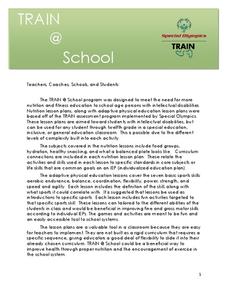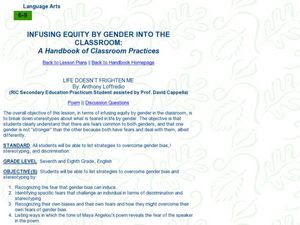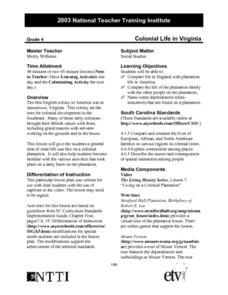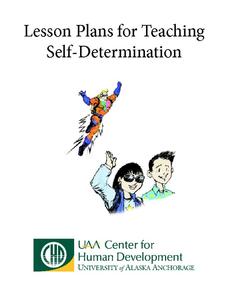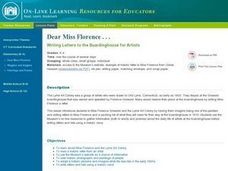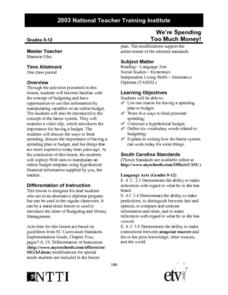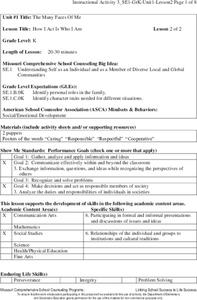Special Olympics
Train at School
Keep your mind and body fit with a fun activity about the five food groups. After going over the functions of fruit, vegetables, grains, meats and beans, and dairy, as well as oils and fats, learners participate in a bean bag toss to...
Curated OER
Life Doesn't Frighten Me
Students work with younger students to collaborate to create a painting. In this lesson, students read Life Doesn't Frighten Me. High School students write and discuss fears with Kindergarten children, and then create an artwork showing...
Curated OER
Colonial Life in Virginia
Fourth graders compare and contrast life in England with plantation life in America. They study the dependencies or mini-industries that could be found on plantations.
University of Alaska
Lesson Plans for Teaching Self-Determination
How do we prepare kids, especially those with disabilities, for life after school, for the workplace, for independent living? This 96-page packet is loaded with self-assessment surveys, with skill builders, with information about rules,...
Curated OER
Dear Miss Florence: Writing Letters To the Boardinghouse for Artists
Imagine being one of the painters in 1910 at the Lyme Art Colony in Connecticut. Using the Florence Griswold Museum's on-line resources to gather information about the daily life of artists at the boardinghouse, learners write a letter...
Curated OER
Growing on My Own, Kids on the Grow
Students participate in an after school program that promotes critical thinking, concern for others, recognizing differences, accepting differences, self-motivation and personal safety. They cover how kids develop, expressing different...
Curated OER
We're Spending Too Much Money
Students discuss the reasons for having a budget. They create their own personal budget and explain how the bartering system can work for some items today.
Curated OER
Reproduction, Day 3: Parenthood
Teenagers explain the process from making the decision to have a baby to parenthood. They identify the positive and negative aspects of parenting. In small groups, they browse catalogs of baby equipment and evaluate the cost of...
Curated OER
Introduction to Cause and Effect
Teach your special education students about cause and effect with this SMART board activity. After analyzing real-life examples of cause and effect -'What happens when you eat too much? What happens when you don't get enough sleep?"-...
Pulitzer Center
Food Insecurity
Food insecurity, whether as a result of food scarcity or a lack of nutritious food, is a growing and serious problem in the world today. After discussing the concept of food insecurity, learners listen to an NPR radio broadcast on the...
World Globes & Maps
United States Map- Intermediate Directions
Students identify the four intermediate directions. For this map skills lesson plan, students use post-it notes to label the four intermediate directions on a map. Students locate various states using intermediate directions.
PBS
The Caterpillar or Larva
The larval stage of the butterfly life cycle is quite exciting. Start a discussion about the specially designed body parts unique to caterpillars. After examining images of caterpillars, learners use plastic soda bottles, string, and...
Curated OER
News-2 You Weekly Activities
Students complete activities from a special education newspaper. In this News-2 lesson, students read the paper, play games, and complete worksheets. Subscription to newspaper is required.
King Country
Lesson 7: Relationships - Day 5: Acquaintances & Strangers
What is the difference between a friend and an acquaintance? What about an acquaintance and a stranger? As part of a unit on Family Life and Sexual Health (FLASH), class members role play appropriate responses to situations involving...
Brain Parade
See.Touch.Learn.
Here is a great app that has tons of potential in helping your child or student with severe to moderate autism, or other intellectual disability, learn words and concepts using research-based methods. Children with autism or PDD NOS have...
Curated OER
STD & AIDS, Day 2: Sexually Transmitted Diseases (STDs)
Keep your secondary special education class informed and aware of STDs, HIV, and AIDS. They learn what STD stands for, how STDs are transmitted, and how to protect themselves. A case study, note to care provider, handouts, transparency,...
King Country
Lesson 10: Communication - Day 3: Asking for What You Want
High schoolers practice appropriate verbal and non-verbal methods of asking for what they want in a lesson designed for the special education classroom.
King Country
Lesson 4: Relationships - Day 2: Gender Identification
Gender roles and gender identity are the focus of a instructional activity designed for high school special education classes. Read the introduction to the packet carefully, as it contains advice about how to approach the subject with...
King Country
Lesson 9: Communication - Day 2: Assertiveness
Appropriate assertive and non-verbal assertive communication is the focus of this lesson plan designed for the special education classroom. Using mirrors, class members practice assertive responses to a variety of situations.
Curated OER
Learning Through Autobiographical Situations
A special education classroom examines a variety of literature from Latin American authors. In groups, they read excerpts from many autobiographies and compare them with their own life. After writing their own autobiographies, they...
University of Oklahoma
Developing My Resources
Learners with special needs create Summary of Performance (SOP), a written document which describes their disability, its impact on their daily life, ways they have learned to compensate, their personal strengths, and their goals. The...
Council for the Curriculum, Examinations and Assessment
Learning About Learning
Successful people know that they never stop learning. Eighth graders explore their preferred ways to learn new information with a reflective lesson about learning styles, that features surveys, writing prompts, and discussion questions.
Missouri Department of Elementary
How I Act Is Who I Am
A lesson centers itself around the topic of family roles. A whole-class discussion uses puppets and posters to go in-depth into the following character traits; caring, responsibility, respect, and cooperation. The discussion closes with...
Do2Learn
Toileting Picture Cards
Assist scholars in the restroom with a set of cards created to show every step needed to follow. Each picture details a specific step from closing the bathroom door to drying your hands.


